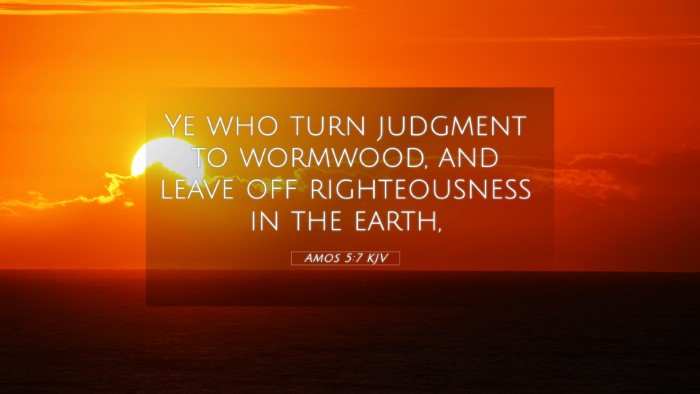Old Testament
Genesis Exodus Leviticus Numbers Deuteronomy Joshua Judges Ruth 1 Samuel 2 Samuel 1 Kings 2 Kings 1 Chronicles 2 Chronicles Ezra Nehemiah Esther Job Psalms Proverbs Ecclesiastes Song of Solomon Isaiah Jeremiah Lamentations Ezekiel Daniel Hosea Joel Amos Obadiah Jonah Micah Nahum Habakkuk Zephaniah Haggai Zechariah MalachiAmos 5:7 Similar Verses
Amos 5:7 Cross References
Ye who turn judgment to wormwood, and leave off righteousness in the earth,
Uncover the Rich Themes and Topics of This Bible Verse
Listed below are the Bible themes associated with Amos 5:7. We invite you to explore each theme to gain deeper insights into the Scriptures.
Amos 5:7 Cross Reference Verses
This section features a detailed cross-reference designed to enrich your understanding of the Scriptures. Below, you will find carefully selected verses that echo the themes and teachings related to Amos 5:7 KJV. Click on any image to explore detailed analyses of related Bible verses and uncover deeper theological insights.

Amos 6:12 (KJV) »
Shall horses run upon the rock? will one plow there with oxen? for ye have turned judgment into gall, and the fruit of righteousness into hemlock:
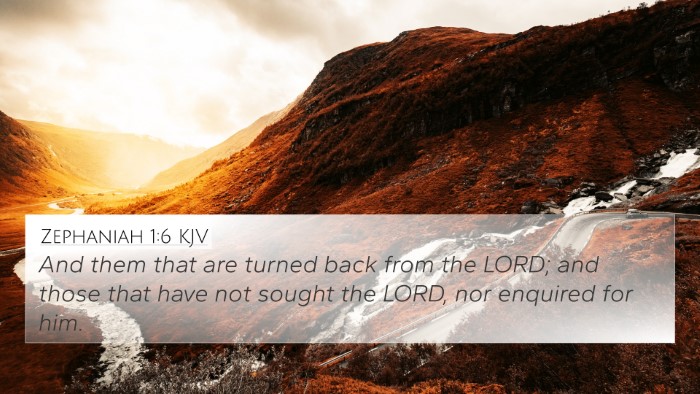
Zephaniah 1:6 (KJV) »
And them that are turned back from the LORD; and those that have not sought the LORD, nor enquired for him.

Hosea 10:4 (KJV) »
They have spoken words, swearing falsely in making a covenant: thus judgment springeth up as hemlock in the furrows of the field.

Habakkuk 1:12 (KJV) »
Art thou not from everlasting, O LORD my God, mine Holy One? we shall not die. O LORD, thou hast ordained them for judgment; and, O mighty God, thou hast established them for correction.
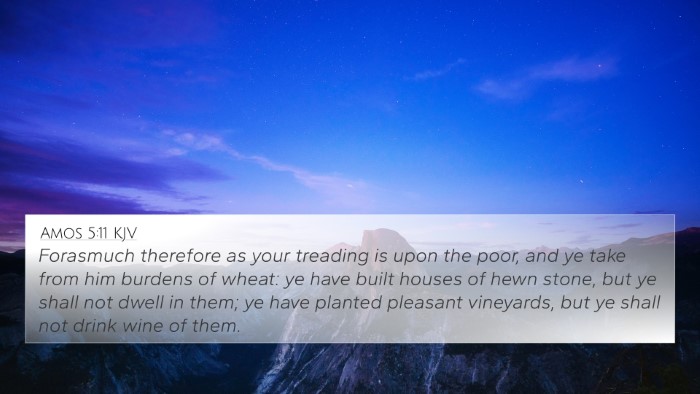
Amos 5:11 (KJV) »
Forasmuch therefore as your treading is upon the poor, and ye take from him burdens of wheat: ye have built houses of hewn stone, but ye shall not dwell in them; ye have planted pleasant vineyards, but ye shall not drink wine of them.
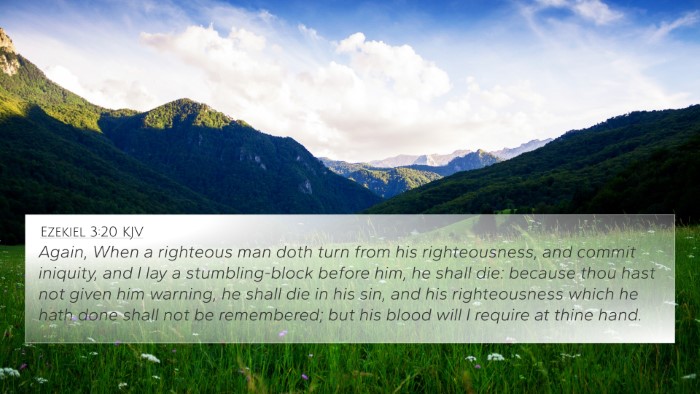
Ezekiel 3:20 (KJV) »
Again, When a righteous man doth turn from his righteousness, and commit iniquity, and I lay a stumbling-block before him, he shall die: because thou hast not given him warning, he shall die in his sin, and his righteousness which he hath done shall not be remembered; but his blood will I require at thine hand.
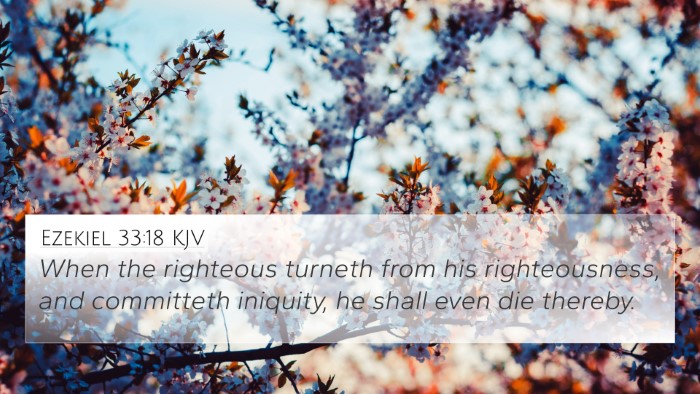
Ezekiel 33:18 (KJV) »
When the righteous turneth from his righteousness, and committeth iniquity, he shall even die thereby.
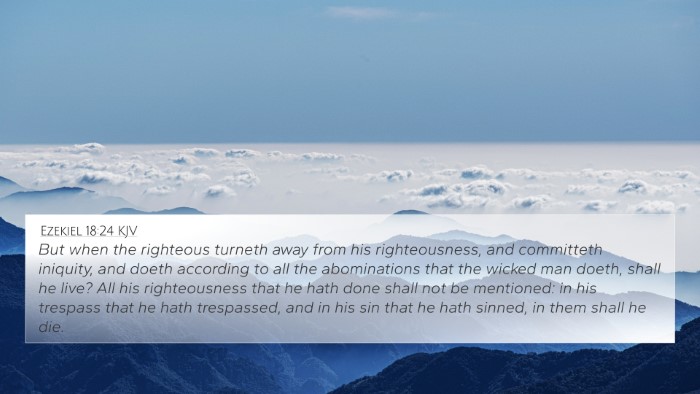
Ezekiel 18:24 (KJV) »
But when the righteous turneth away from his righteousness, and committeth iniquity, and doeth according to all the abominations that the wicked man doeth, shall he live? All his righteousness that he hath done shall not be mentioned: in his trespass that he hath trespassed, and in his sin that he hath sinned, in them shall he die.
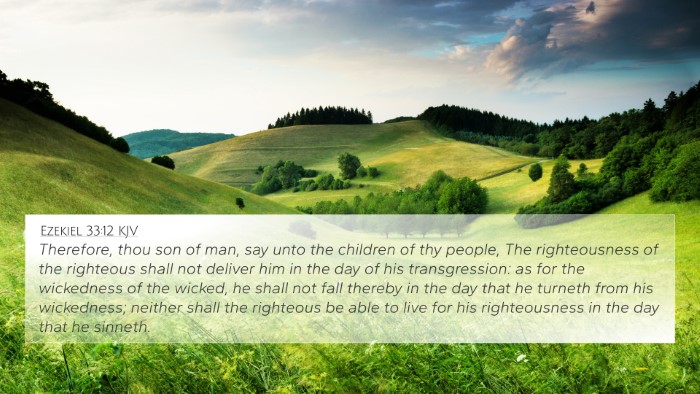
Ezekiel 33:12 (KJV) »
Therefore, thou son of man, say unto the children of thy people, The righteousness of the righteous shall not deliver him in the day of his transgression: as for the wickedness of the wicked, he shall not fall thereby in the day that he turneth from his wickedness; neither shall the righteous be able to live for his righteousness in the day that he sinneth.
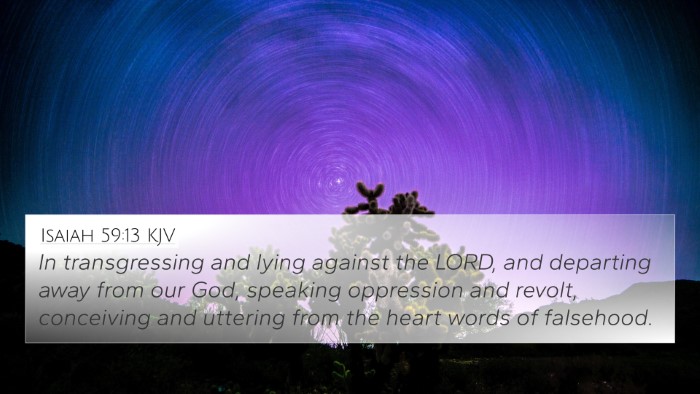
Isaiah 59:13 (KJV) »
In transgressing and lying against the LORD, and departing away from our God, speaking oppression and revolt, conceiving and uttering from the heart words of falsehood.
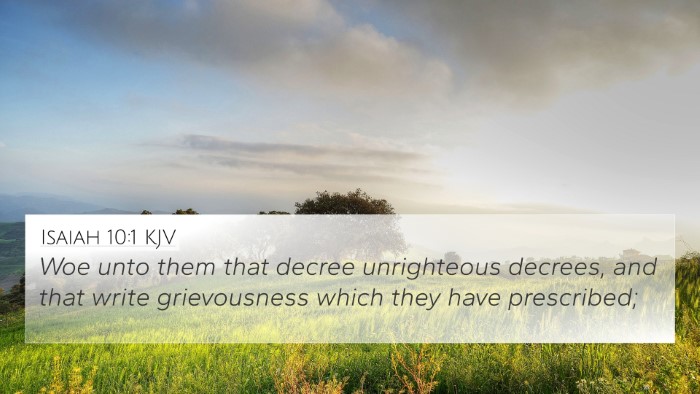
Isaiah 10:1 (KJV) »
Woe unto them that decree unrighteous decrees, and that write grievousness which they have prescribed;
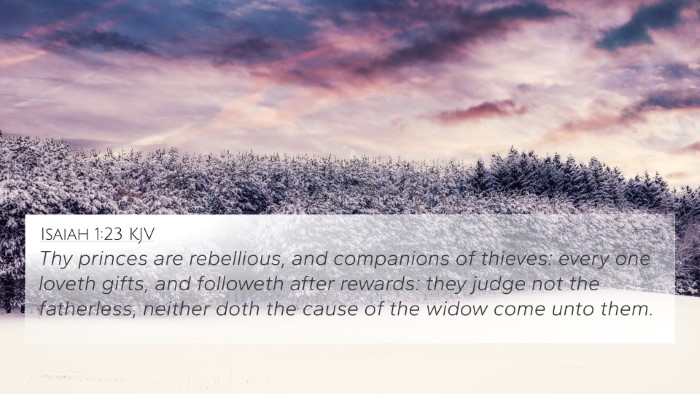
Isaiah 1:23 (KJV) »
Thy princes are rebellious, and companions of thieves: every one loveth gifts, and followeth after rewards: they judge not the fatherless, neither doth the cause of the widow come unto them.
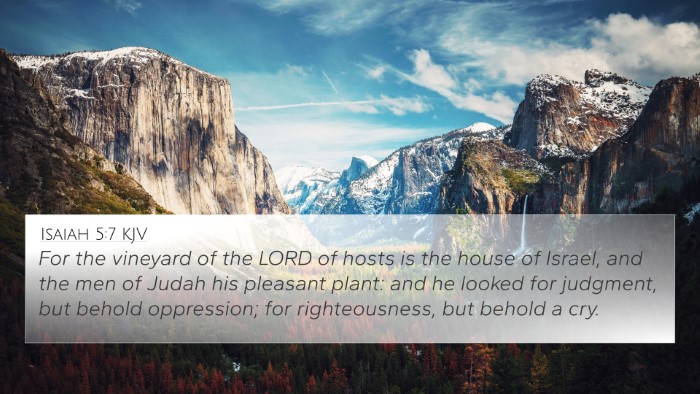
Isaiah 5:7 (KJV) »
For the vineyard of the LORD of hosts is the house of Israel, and the men of Judah his pleasant plant: and he looked for judgment, but behold oppression; for righteousness, but behold a cry.
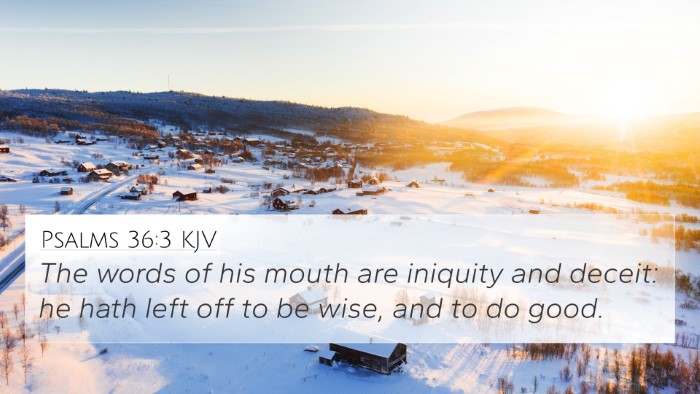
Psalms 36:3 (KJV) »
The words of his mouth are iniquity and deceit: he hath left off to be wise, and to do good.
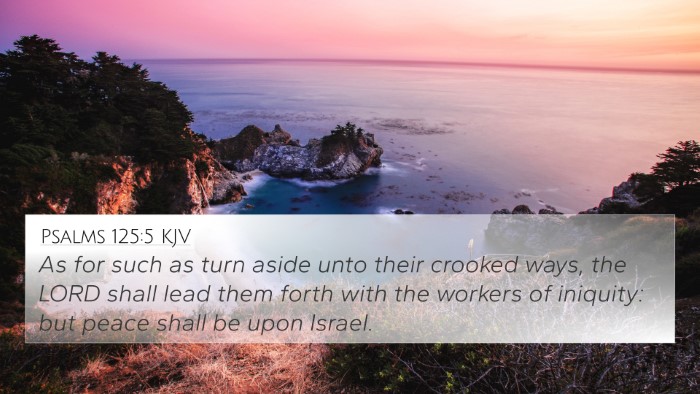
Psalms 125:5 (KJV) »
As for such as turn aside unto their crooked ways, the LORD shall lead them forth with the workers of iniquity: but peace shall be upon Israel.

Deuteronomy 29:18 (KJV) »
Lest there should be among you man, or woman, or family, or tribe, whose heart turneth away this day from the LORD our God, to go and serve the gods of these nations; lest there should be among you a root that beareth gall and wormwood;
Amos 5:7 Verse Analysis and Similar Verses
Amos 5:7 - Understanding the Meaning
Amos 5:7 states, "You who turn justice into bitterness and cast righteousness to the ground." This verse highlights a critical social issue during the time of Amos, reflecting God's concern for justice and righteousness among His people.
Context of Amos 5:7
The book of Amos is a prophetic text emphasizing the need for social justice and spiritual integrity. Amos, a shepherd and farmer, prophesied against the northern kingdom of Israel during a time of prosperity, which ironically was marred by moral decay and injustice. The prophet condemns the elite for perverting justice, which leads to a warning of impending judgment from God.
Commentary Insights
-
Matthew Henry's Commentary:
Henry describes how the people of Israel have turned away from divine justice, embracing sinful practices. They have twisted God's laws for their convenience, leading to societal bitterness.
-
Albert Barnes' Notes:
Barnes emphasizes the responsibility of leaders and judges who fail to uphold justice. He points out that the perversion of righteousness leads to God's displeasure and potential punishment, highlighting the importance of ethical conduct.
-
Adam Clarke's Commentary:
Clarke notes that the phrase "turn justice into bitterness" illustrates a deliberate act of corruption. He warns against the societal consequences of abandoning righteousness, suggesting that such actions will evoke divine retribution.
Cross-References for Amos 5:7
This verse connects with several other biblical passages that highlight similar themes of justice and righteousness:
- Isaiah 10:1-2: A warning against unjust laws and those who enact them.
- Micah 6:8: God's demand for justice, mercy, and humility from His people.
- Proverbs 21:15: A statement about the joy of just judgment to righteous people and the dread it brings to evildoers.
- Jeremiah 22:3: A call to execute justice and righteousness among the people to avoid judgment.
- Zechariah 7:9-10: An exhortation to administer true justice and show mercy and compassion.
- Psalm 82:3-4: A plea for justice for the needy and the oppressed.
- Matthew 23:23: Jesus rebukes the Pharisees for neglecting justice, mercy, and faithfulness in their ritualistic practices.
- Luke 18:3-5: The parable of the persistent widow highlights the importance of justice.
- James 1:27: Pure religion emphasizes visiting orphans and widows and keeping oneself unstained from the world.
- 1 John 2:29: Those who practice righteousness are born of God, linking morality with true faith.
Thematic Connections in Scripture
Amos 5:7 makes broader thematic connections throughout the Bible, emphasizing God's demand for justice and righteousness:
- Justice and Social Responsibility: The Bible consistently calls on the faithful to uphold justice, reflecting God’s character.
- Righteousness as Divine Expectation: Righteousness is often portrayed as a reflection of one's relationship with God and obedience to His commands.
- Consequences of Injustice: The prophetic literature frequently warns of divine judgment resulting from societal corruption.
- Mercy and Compassion: Alongside justice, God calls His people to exhibit mercy, particularly towards the marginalized.
Tools for Bible Cross-Referencing
For deeper understanding, utilizing tools for Bible cross-referencing can enrich your study:
- Bible Concordance: A helpful resource for finding related verses.
- Bible Cross-Reference Guide: Guides that link similar themes across different scriptures.
- Cross-Reference Bible Study: Methods to analyze connections between verses for thematic studies.
Conclusion
Amos 5:7 serves as a powerful reminder of God's expectation for justice and righteousness in the lives of His people. By understanding this verse in conjunction with the wider biblical context and using tools for cross-referencing, one can gain a more profound insight into God's character and His will for humanity.

